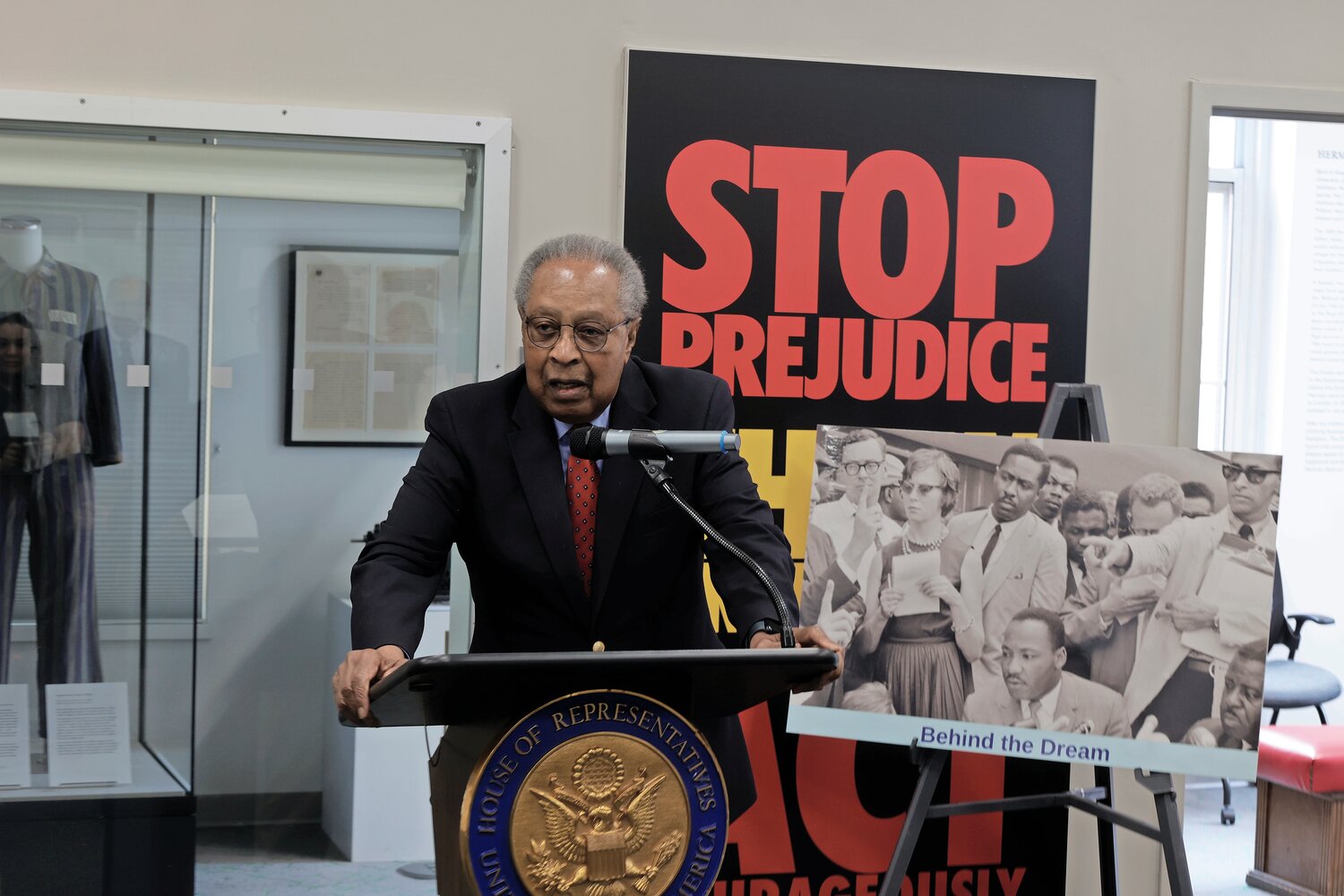MLK speechwriter Clarence Jones is never done fighting hate
Civil rights attorney, 92, highlights coalition between Black, Jewish communities
More than six years ago civil rights attorney Clarence Jones turned on the television and what he saw on the news troubled him. A group of young white men in Charlottesville, Virginia, were carrying torches in the street and chanting, “the Jews will not replace us.”
This sight took Jones back to November 1938, when the Nazis and Gestapo took to the streets of Berlin and smashed the windows of Jewish-owned-and-operated businesses in an event that would come to be known as Kristallnacht, or the Night of Broken Glass.
In Jewish history this became a symbol of some of the worst brutal acts of antisemitism, apart from the gas chambers, Jones, who was 7 at the time, explained to The Riverdale Press. He never thought he would grow up to see neo-Nazis on American television.
“I said ‘God help us, are my eyes playing tricks on me?’” Jones said. “And that was a major shocking point, it was a wake-up call and I thought I was pretty smart. I said, ‘Clarence, if you don’t get your Black ass off this couch, these people are going to take over the country.
“And you can’t do that, you can’t sit on your butt. Because you have this relationship with Martin King, you would just be defiling everything, you’d be destroying every part of legacy you had with him if you did not actively get up to control this antisemitism.”
Jones has devoted his every breath and energy to fight bigotry. Last March, Jones accepted the role of chairman of the Spill the Honey Foundation, a non-profit organization whose mission is to highlight the historic alliances between African American and Jewish communities.
“Today lying beneath the streets of every city and community in this country, like molten-lava is violence and antisemitsim just waiting to erupt,” Jones said. “And I have decided to be proactive and pre-emptive and that’s why I publicly proclaim my work as chairman of the board of the Spill the Honey Foundation.”
It was fitting for Jones to become chair of the nonprofit because the 11-year-old organization was inspired by King and Holocaust survivor Elizer Ayalon.
Before Ayalon’s mother was sent away to a concentration camp, she gave him a cup of honey. The honey that symbolized a sense of hope and survival became the inspiration for the organization’s name.
During the Civil Rights movement, Jones witnessed firsthand how Black churches and Jewish communities, under the leadership of Martin Luther King Jr., enabled the successful enactment of the Civil Rights Bill of 1964 and the Voting Rights Act of 1965.
This August, Jones published “The Last of the Lions,” a book that chronicles his upbringing with Irish Catholic nuns at a Catholic boarding school, the planning for the March on Washington, and conversations Jones had with King while the civil rights leader stayed in his Riverdale home. The book has received praise from former president Barack Obama, NBA player Steph Curry, and documentary filmmaker Ken Burns.
He explained the title of the book to The Press.
“The title comes from an African proverb which says ‘If surviving lions don’t tell their stories, the hunters will get all the credit.’ So I thought that was very appropriate,” he said.
It meant “I’m one of the last of those persons remaining who is able to tell our story as it happened rather than have the story be told by persons who did not experience it and who were by definition an outsider.”
Jones shared what it was like to live in his Riverdale home at 4635 Douglas Ave. He lived across from the people who owned the Stella D’oro cookie empire and lived near former Manhattan District Attorney Robert Morgenthau.
“It was a community in which it was a struggle to get Blacks into some of the apartment houses in Riverdale at the time,” Jones said. “I remember there was some opposition to having Blacks move into the apartments in Riverdale.”
Thinking about living in Riverdale gave Jones’ son, Clarence Benjamin Jr. Jones, goosebumps and smiles. He was a high school football star at Riverdale Country School in 1979 and used to keep a scrapbook of clippings of the times he was mentioned in The Press.
“Growing up in 4635 Douglas Ave., it was a beautiful home and a beautiful neighborhood,” said Jones Jr. “I remember fondly the ability to just be a kid. It was just a wonderful place to grow up and be a kid, walking around the neighborhood, being able to walk to school. Wow, I can even visualize the driveway, the garage, the first floor, the second floor, the big picture windows to which we could look out and I think we could see the Henry hudson River in the winter when the leaves were off the tree, and the garden where, Dad, I think we put Mom’s ashes in the garden in the back.”
Jones credits the West Bronx and Riverdale for the large political support with what the coalition was doing at the time. It was in 1963 that Jones’ wife informed him that they would be staying in another house while the King family stayed at their home in the leadup to the March on Washington. It was during the six weeks that King stayed at the Douglas Avenue home that Jones co-wrote the “I Have a Dream speech.”
“I like the record to reflect that Dr. King was fully capable and able of writing all of his speeches,” Jones said. “He didn’t need me or anyone else to write any speeches for him.”
During conference calls with King, Jones used to address the FBI he suspected were listening in on them.
“I’d be one of the first persons to speak in the call,” Jones recounted. “And I’d say ‘okay, hello Mr./Mrs. FBI person, hope you got your pencil and pen ready. Be sure to spell my name right,’ and so forth. And Martin King used to berate me for going through all this humorous shenanigans so to speak.
“In fact, as I said in a couple of interviews, he regarded me as being a left wing McCarthyite. ‘You see, you’re like a left wing Joe McCarthy. You see the FBI under every bed and any nook and cranny.’ I said, ‘yes, I do because I believe that’s what they want to do.’
Jones’ suspicions were more than confirmed when years later he had FBI file transcripts of his own conversations.
For better or worse, those transcripts are one example of how Jones’ significant work and legacy has been further immortalized.
Earlier this month U.S. Rep. Ritchie Torres presented Jones with an official statement placed in the Congressional Record. That event marked the beginning of the annual Dr. Clarence B. Jones “I Have a Dream Award.” At the event Jones sang his praise for the congressman, and it was no different during this interview.
“Congressman Torres is the tip of the spear of a new generation,” he said. “And Riverdale, the Bronx, should be very proud that the originating point of that spear comes from the congressional district represented by Congressperson Torres. And I’m just grateful that my genetics and environment, whatever it is in my genes or background in my living, that enabled me to be just a couple months from 93 years of age and still feel very passionate.”
There is no doubt that Jones is as passionate about fighting injustice as he was during the Civil Rights Movement. Whether that be discrimination against the LGBTQ+, attacks on women’s bodies, or simply encouraging youth to vote.
“Voting is power, let me just break it down to you,” Jones said. “Voting is power and power concedes nothing without a demand. You want to get something changed, it’s not going to happen by wishing for it. It’s just not going to happen. If you want to affect political change you’ve got to exercise the political power to do so.”
“More powerful than the march of mighty armies is an idea whose time has come,” Jones said in quoting the French Romantic writer Victor Hugo.









